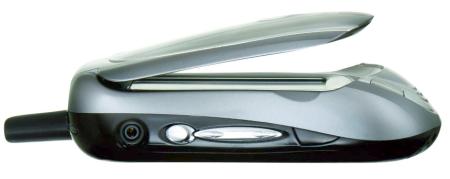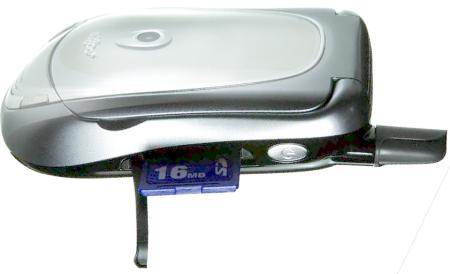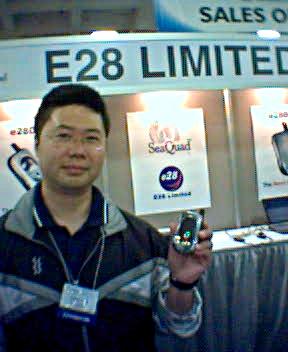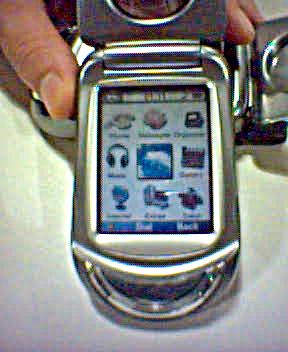Award-winning Linux smartphone ready for US launch
Aug 2, 2004 — by LinuxDevices Staff — from the LinuxDevices Archive — 1 views [Updated Aug. 6, 2004] — A Linux smartphone will soon be available to US cellular subscribers in the Chicago area. Shanghai-based E28's e2800+ has been available in China since July, and builds upon E28's previous e2800 model, which was the world's first commercially available Linux smartphone, E28 says. The device, which targets business users, currently features dual-band 900/1800MHz communications, a GPRS/CSD modem, and a 300K pixel camera. A model that supports US communications standards at 900/1800/1900MHz is set to be launched shortly.
[Updated Aug. 6, 2004] — A Linux smartphone will soon be available to US cellular subscribers in the Chicago area. Shanghai-based E28's e2800+ has been available in China since July, and builds upon E28's previous e2800 model, which was the world's first commercially available Linux smartphone, E28 says. The device, which targets business users, currently features dual-band 900/1800MHz communications, a GPRS/CSD modem, and a 300K pixel camera. A model that supports US communications standards at 900/1800/1900MHz is set to be launched shortly.

Like the previous e2800, the e2800+ features a clamshell design
(Click above image to enlarge)
According to E28, the original e2800 launched in China in August, 2003, and did very well in several Asian markets, including Hong Kong, where it rolled out on December 15, 2003. The phone won several media awards, including:
- Named “Coolest Business Phone” in 2003 Mobile Phone Media Awards, a reader survey with 40,000 respondents presented by Nanfang Daily and The Beijing News
- “Smartphone of the Year” in PCOnline's 2003 Editor's Choice awards
- “Top 10 Mobile Phone” according to Younet and 21CN.com
 The updated e2800+, too, is proving to be a magnet for media awards; the phone has been named a finalist in this year's “Product Excellence Awards” at LinuxWorld.
The updated e2800+, too, is proving to be a magnet for media awards; the phone has been named a finalist in this year's “Product Excellence Awards” at LinuxWorld.
CEO Roger I. Kung said, “We believe Linux is the OS of choice for the consumer smart-phone market because of its flexibility and low cost. It is also an open architecture that allows us to optimize the phone's user interface. E28 is the major mover for Linux Mobile Alliance with the intent to boost embedded Linux [as a] major smart-phone operating system for mobile phone markets.”
E28 is the founder of a recently launched initiative known as the Linux Mobile Alliance, whose goal is to “make Linux the number one operating system in mobile communications.”
Late last week, Motorola disclosed plans to launch its recently announced A780 Linux smartphone globally in early Q4, and in select US regions before before the end of this year.

The e2800+ supports SD/MMC cards up to 1GB
(Click above image to enlarge)
About the e2800+
The e2800+ measures 3.9 x 2.3 x 1 inch (98 x 59 x 26 mm) and includes a 2.4-inch, quarter-VGA (240×320) thin-film transistor (TFT) LCD, supporting 65K colors via dithering technology (the previous e2800 supported only 4K colors). The display also functions as a touchscreen that supports handwriting recognition. I/O ports include USB 1.1 and IrDA.

E28 Director of Data Platform Design Kenneth Lam works in E28's Hong Kong office, and proudly displays his pet project at the LinuxWorld trade show in San Francisco
The device includes a built-in speaker, 32 polyphonic ringtones, and 7-color LED indicators that display phone status. It also includes hard keys for cursor/menu control, and camera and mp3 player operation.
The e2800+ is based on a 300MHz ARM9 processor (the previous e2800 was clocked at 200MHz). It boots from 32MB of Flash, and runs in 64MB of system RAM. An SD/MMC card reader offers up to 1GB of storage expansion through removable memory cards.
The device is powered by a 1030mAH Li-Polymer battery, yielding a claimed 75-130 hours of standby and 120-300 minutes of talk time.
Software side
The Linux OS used in the e2800+ supports English, Simplified Chinese, and Complex Chinese, according to E28.

The main menu offers icons for the basic phone, PDA, camera, media player, and other applications
Additional features listed by E28 include:
- JAVA MIDP 1.0 with manufacturer extension
- supports OTAP (over the air provisioning)
- WWW browser supports HTTP1.1, HTML3.2, JavaScript
- WAP Browser supports WAP 2.0
- eMail: POP3, SMTP, MIME, four accounts
- eBook reader supports PRC, PDB, and OEB formats
- Audio player supports MP3, MIDI, and AMR formats
- Photo viewer/editor supports JPG, GIF, GIFa, PNG, BMP, and wBMP formats
- Video player/recorder supports MPEG4, H.263, 3GP, and MP4 formats
- Direct print
- Built-in games
- Personalization software
- Contact manager with voice and photo dialing
- Calendar
- Memo (Text, Writing, Drawing)
- World clock
- Alarm clock (effective under power off)
- SMS/EMS/MMS messaging client
- STK
- Voice recorder
- Calculator
- PC synchronization
- Auto power off
- Support vCard and vCalendar via IrDA/SMS
- Privacy protection
- Usage mode
- Mobile disk
- GPRS/CSD Modem
- Auto Configuration Profile
- Voice messaging software
- One touch dialing and mute
About E28
E28 was founded expressly to execute on the promise of Linux for smartphones. It was founded in 2002 by Roger I. Kung, who left his position as president of Motorola's Personal Communications Sector in the Asia Pacific region to do so. At Motorola, Kung was responsible for $4 billion of business, according to e28.
E28 employs more than 100 dedicated smartphone engineers “with an average of five years wireless experience in multi-national mobile phone companies,” according to the company's Website. The company is “well funded by a multi-billion dollar computer equipment manufacturer,” the Website adds.
E28's product roadmap for its Linux based smartphones includes support for EDGE, a 2.75G Internet access technology with growing penetration in Europe and the Americas, and UMTS, a 3G Internet access technology available in Europe, Japan, and elsewhere. e28 CTO Nathan Wang adds, “Other than smart-phone products aiming for various market segments, we are also working on a reference design and its associated application software.”
E28 is based in Shanghai, China, and maintains an office in Hong Kong which is engaged in product development, sales, distribution, and service activities.
US distribution
SeaQuad Logistics will serve as E28's sales, distribution, and logistics provider for North America, E28 says.
Watch this space as further details emerge! Or, visit E28's booth at LinuxWorld in San Francisco this week for further info.
This article was originally published on LinuxDevices.com and has been donated to the open source community by QuinStreet Inc. Please visit LinuxToday.com for up-to-date news and articles about Linux and open source.